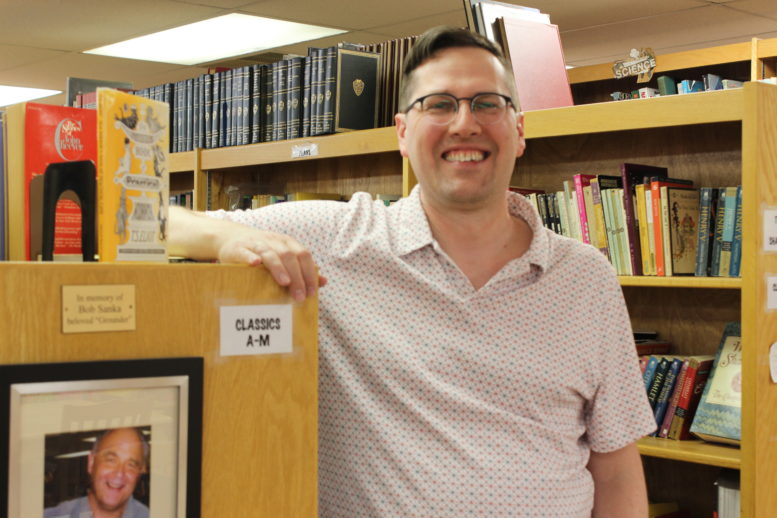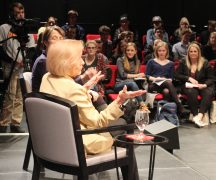By DAVID DUPONT
BG Independent News
For Jonathan Chambers, theater is a venture into the unknown.
“I’m interested in directing shows I don’t understand,” he said. “I see the creative endeavor of working on a show or writing an essay as the same. … It’s about my coming to a new understanding.”
Chambers has taught at Bowling Green State University for 15 years, directing a show a year. They’ve ranged from “Quiet in the Land,” an intense drama about the Amish in World War I, to the giddy musical satire “Urinetown.”
So when he started his most recent production “Middletown” in November, it was important for him to take the time to discuss the ideas embedded in the script with his young cast.
Chambers doesn’t see a divide between the lecture hall and the stage.
“I never found those two endeavors as separate,” he said in a recent interview. “I look for opportunities to spread that point of view to my students. … To me those two endeavors are more linked than separate. The idea of being a scholar artist is one I’ve tried to embrace in my career and, in turn, pass on to my students.”
This mix of scholarship, teaching, and mentorship has been recognized by the American Theatre and Drama Society which has awarded Chambers its Betty Jean Jones Award. The award honors Chambers work over the span of a career. Chambers taught at St. Lawrence University in northern New York before coming to BGSU.
He moved around when he was young as his father, a Church of Christ minister, moved from church to church. He sent his early years in western Pennsylvania, just outside of Pittsburgh. He still considers that home. But when he was a teenager his family was “all over the place” – Denver, Spokane, and Lexington, Tennessee.
“I was somewhat involved in theater in high school, not deeply involved,” he said.
Chambers attended Milligan College in Tennessee, where he majored in English with a minor in voice performance. In 1987 as a senior, he decided to audition for “Children of a Lesser God.” He was cast in the role of Orin. Both he and the show earned regional honors in the Academy College Theater Festival.
“That show changed it for me,” Chambers said. “I started to understand the discipline of acting.”
While he had been considering following his mother’s footsteps and becoming an academic librarian, now he pursued acting. He spent two years at the Barter Theatre in Virginia. He spent one year as an intern and one year as a member of the company “collecting my points for my equity card.”
Looking back at his experience at Milligan he thought his drama professor had “a pretty cool job,” so he decided to do graduate studies. He attended Virginia Commonwealth to get a Masters of Fine Arts in Acting. He discovered theater scholarship, and found he like doing research.
He also realized that plays he was drawn to “were not commercial. I liked the plays that were about ideas.”
Also, at Virginia Commonwealth, he met his wife, Sara Lipinski Chambers. Halfway through his MFA studies he decided to pursue a PhD and ended up at Southern Illinois University, chosen he said “because they were the friendliest.”
At that point, he was unaware of the pecking order in theater programs. He was accepted at a school considered more prestigious but “they were sort of rude to me.”
“I made a lot of decisions,” Chambers said, “where I had better luck than better planning.”
His first teaching position was at St. Lawrence. He and the family moved to Bowling Green where Lipinski Chambers also teaches in the Department of Theatre and Film.
In 2006, Chambers published “Messiah of the New Technique: John Howard Lawson, Communism and American Theatre, 1923-1937.”
His current scholarly occupation is “Slow Down: The Slow Movement and Its Relationship to the Academy,” which he is collaborating on with Stephannie Gearhart, a colleague from the English Department.
“I’m writing a piece on the ways in which frequently academic theater seeks to replicate commercial theater practices,” he said. Theater history, though, is replete with examples of directors who took months, if not years, to produce a play, he said. “That’s not to suggest there’s not room for the commercial theater model, but there are other ways to work.”
While at St. Lawrence, he taught a semester-long class devoted to staging “Polaroid Stories” by Naomi Iizuka. The students did research on the play as well as handling all aspects of the production. It merged scholarship with staging. And then, he was able to weave insights from the process into the paper.
“I never imagined myself as a director,” Chambers said. He came to it as part of his academic duties. “I love working with student actors because I love the process of acting.”
He said his wife, who is trained and active as a director, says his strong point is his rapport with actors and “my real weakness is pacing, and I’d agree with her on that.”
The couple have two sons, Baxter and Truman, both students at BGSU. Baxter is majoring in Peace Studies, and is involved in theater. Truman is in the School of Art.
They’ve also founded Broken Spectacle Productions, which for the past several years has staged contemporary plays in unusual venues, such as Grumpy Dave’s and the former Café Havana.
The company, which is now producing a series of short films, was created to explore more cutting edge drama that for various reasons might not be suited to being produced on campus.
Also, it allows them to get new plays on stage with an expedited schedule, not having to wait the three years it takes to get approval through the Department of Theatre and Film’s committee system.
Other ventures into the theatrical unknown beckon. Chambers would like to take on the alternative rock musical “Bloody Bloody Andrew Jackson” by Alex Timbers. For now, he said, doing a musical is more that Broken Spectacle could manage.





